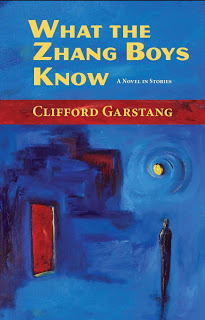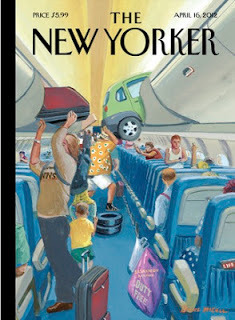Clifford Garstang's Blog, page 104
April 27, 2012
Writing the Short Story: Make Your Story Great! New class begins May 7
 I teach a short story class through Writers.com and the next session begins in a little over a week, on May 7. In the past, students have found this course extremely beneficial. Not only does the class cover the fundamentals of fiction writing over the course of 10 weeks, but also every student has the opportunity to workshop a 20 page story with the class, PLUS share revisions of that story based on the feedback in the class. The combination of lectures and workshop is a great deal!
I teach a short story class through Writers.com and the next session begins in a little over a week, on May 7. In the past, students have found this course extremely beneficial. Not only does the class cover the fundamentals of fiction writing over the course of 10 weeks, but also every student has the opportunity to workshop a 20 page story with the class, PLUS share revisions of that story based on the feedback in the class. The combination of lectures and workshop is a great deal!Topics covered in the class include beginnings (finding traction), character, plot, setting, dialogue, theme, time, symbolism, and endings. For the complete course description, go here.
Please consider signing up for the class or passing the information along to a friend.
Published on April 27, 2012 16:43
Forthcoming Books: What the Zhang Boys Know, a novel in stories
 It's been a busy week, so there hasn't been much time for blogging. And there still isn't, but I wanted to post this image of the cover of my new book, What the Zhang Boys Know, a novel in stories that will be published on September 1 by Press 53.
It's been a busy week, so there hasn't been much time for blogging. And there still isn't, but I wanted to post this image of the cover of my new book, What the Zhang Boys Know, a novel in stories that will be published on September 1 by Press 53.I'm excited about this release. The stories that make up the novel center on Nanking Mansion, a condominium building on the edge of Washington, DC's Chinatown. As the book begins, Zhang Feng-qi, an immigrant from Shanghai, has just lost his American wife in a Beltway automobile accident and is faced with the challenge of raising their two sons. He begins a search for a replacement wife while the boys are convinced that their mother will come back (because they learned in Sunday School that it could happen). Along the way, readers meet the other residents of the building, a diverse mix of artists, teachers, writers, and lawyers.
Stories from the book have appeared in Bellevue Literary Review, Blackbird, Valparaiso Fiction Review, Cream City Review, Wisconsin Review, Tampa Review, Prime Mincer, FRiGG and GSU Review (New South).
Stay tuned for information about pre-ordering and appearances.
Published on April 27, 2012 05:35
April 23, 2012
The New Yorker: "Hand on the Shoulder" by Ian McEwan

April 30, 2012: “Hand on the Shoulder” by Ian McEwan
It seemed evident from reading this “story” (available for free online, by the way), that it is an excerpt from a novel, and this is confirmed in the Q&A with Ian McEwan (the novel is called Sweet Tooth, which I think is a horrible name, but maybe it works for that particular book).
While the prose here is beautiful, and the situation—a woman recruited during the Cold War to work for Britain’s MI5—interesting, as a short story this falls completely flat for me. I kept waiting for something surprising to happen, and it didn't. Everything about it seems trite. Although it has a nice narrative arc and good tension, a story about adultery that meets a bad end is just too stale. Yes, the MI5 angle is interesting, but that’s about it. As a piece of the novel I suspect it’s fine, and I might even read this book, but I wish The New Yorker wouldn’t do this to us.
Published on April 23, 2012 15:46
April 21, 2012
April 25 is End Malaria Day -- How You Can Help
April 25 is End Malaria Day. You can help. Watch the video. Then go to the website and read about the book. Then buy the book. (I just bought the Kindle version so $20 will go toward the cause.) Here's the email I received about this project:
End Malaria, http://www.EndMalariaDay.com, is an astonishing new book by more than sixty best selling business authors and social thought leaders who joined together to share information in a book whose entire profits go to buy malaria bed nets. Malaria is a disease that causes more childhood death than HIV/AIDS.
Malaria bed nets are simple nets that hang over a window or a bed. They're treated with a chemical that mosquitoes hate. The mosquitoes fly away, they don't bite, people don't get malaria.
Every single penny spent on the Kindle edition goes to Malaria No More, giving them enough money to buy one or two bednets and to deliver them and be sure they're used properly. Low overhead, no graft, no waste. Just effectiveness. None of the authors or anyone at the Domino Project receive money to be part of this project.
Wait, there is one ulterior motive: We hope you are inspired. One of the sixty plus contributors might share a gem or spark an idea. The book is a collection of essays from 62 business and social thought leaders about the key drivers to live a life of meaning and impact. Contributors to the book (all of whom donated their work) include David Allen, Tom Peters and Keith Ferrazzi; TED speakers Brene Brown and Sir Ken Robinson; New York Times' best-sellers Jonah Lehrer, Gary Vaynerchuk and Dan Pink; Daymond John and Dave Ramsey; and leaders from organizations such as Google and GlaxoSmithKline.
There's a second motive: Stepping up feels right. It's a few clicks to buy a book and for the rest of the day, or even a week, you'll remember how it felt to save someone's life.
END MALARIA was born out of a passion to save lives by author and Senior Partner of Box of Crayons Michael Bungay Stanier. Teaming up with marketing and publishing innovator and creator of Squidoo.com Seth Godin, they found a way to sell a book and give away all of the profit in the fight against malaria.
" This is the power of authors working together, the power of ebook distribution and most of all, the power of people who care to make a difference. Over and over, we're seeing that a new generation cares about business not just as a way to make money, but as a way to make a difference. These authors (and their readers) are making a difference at the same time they're saving lives." - Seth Godin.
End Malaria Day is April 25, Twitter #EndMalariaDay , www.Facebook.com/endmalariaday
Published on April 21, 2012 05:14
April 20, 2012
Tips for Writers: Back up!

Usually in my Friday Tips for Writers I focus on some element of craft—how to make your work the best it can be. But today I’m going with something more mundane: on a regular basis, backup your work.
If you don’t, I promise someday you’ll be sorry. Your computer will crash or get zapped by a power surge (you do have a surge protector, don’t you?), or will mysteriously disappear from your hard drive (because a certain four year old has been pressing buttons he shouldn’t). Or your computer will be stolen, or you’ll lose your laptop on the redeye from LA to New York, or your house ill burn down, or . . . . And when that happens, your 900 page novel, or your collected poems, or your killer screenplay will be lost to the ages, unless you can recreate it.
Here are some good habits to get into: Every now and then while you’re working, save your work. In Microsoft Word there is an autosave feature, and that’s nice, but if I’m stepping away from the desk for some reason, or stalling, I’ll hit ctrl+s in order to make sure the most recent work is locked into the file. It’s an “abundance of caution” that I don’t feel the least bit guilty about. I almost don’t think about it anymore. Most days, when I close the file I’m working (my novel, for example), I will copy the file to my Dropbox.com account. Dropbox is one of many “storage units” you can find on the Internet. When you sign up for the service (which is free unless you need to backup huge amounts of data), you download an icon to your computer that functions basically like another drive, but one that you can access from other computers. This has the added benefit of allowing me to work on the same document from other computers. There are other ways of accomplishing the same thing, including using Google Docs. Periodically, I also store work on a USB drive and put a copy on my laptop. Unless I’m traveling, my desktop computer is my primary workstation, so that’s where the most recent copies of my files should be, but the laptop and the USB drive are simply backups. I don’t have an external hard drive, but I’ve considered getting one, and that would have both storage and backup help that I might one day want. (I do have an old Zip drive and of course my computer can write to CDs, so those are other backup options, especially for things like photos and videos.)
Whichever method you choose, be sure you do your backups on a regular basis. Starting right now.
Published on April 20, 2012 08:24
April 19, 2012
New Issue of Prime Number Magazine: No. 19
 The new issue of Prime Number Magazine has just gone live.
The new issue of Prime Number Magazine has just gone live.Issue 19--that's the 8th issue, for those familiar with primes--includes short fiction by Laretta Andrews-Mitchell, Frank Scozzari, Arthur Powers, and Gerry Wilson; poetry by Richard Downing and Mary McMyne; nonfiction by Eileen Cunniffe, Michael Royce, Michael Brantley, and Susan Grier; a craft essay by Maria Giura; and reviews of books by Kevin Simmonds, Kirby Gann, and Marc Schuster. The cover photo, shown here, is by Cath Barton.
The editors are now reading for Issue 23 and beyond. As always, we need distinctive poetry and prose: short stories and essays up to 4,000 words; flash fiction and non-fiction up to 1,000 words; short drama; craft essays; book reviews; interviews; poetry of all kinds.
 Take a look at a few of the past issues to get a sense of what we like, and then go to our Submission Manager to submit your best work!
Take a look at a few of the past issues to get a sense of what we like, and then go to our Submission Manager to submit your best work!
Published on April 19, 2012 13:27
April 17, 2012
The New Yorker: "Miss Lora" by Junot Díaz

April 23, 2012: “Miss Lora” by Junot Díaz
Read the story—its available for free online—and then read the Q&A with Junot Diaz, which is at least as interesting. Díaz has a distinct voice, especially in this character of Yunior, whom we’ve seen in his work before. In this story, Yunior’s older brother has died and Yunior, who is sixteen, begins sleeping with Miss Lora, and older woman in the neighborhood.
There isn’t much of a plot, really. The relationship progresses in secret and Yunior goes off to college. And that’s about it. But what’s really happening is that Yunior is growing up and coming to terms with his brother’s death and also with who he himself is. On its own, I don’t love the story, but it’s a nice complement to the other stories that, I gather, will be in a new collection later this year.
One thing I don’t like about this story is the point of view—second person. Díaz says in the Q&A that he knows he’ll lose some people with this approach but that it was the only way he could write it—first person was too close, third too distant. I do believe that second person is sometimes justified. If the speaker is identified and is separate from the “you,” then that is really just a first person dramatic monologue addressed to a second person. More often, however, the “you” and the speaker are the same person—the narrator is speaking to himself. In that case the POV is justified if there is some reason why the narrator is stepping outside of himself—some trauma or life event that, in effect, splits him into two. Jennifer Egan did that well in Goon Squad, Lorrie Moore has done it effectively, but usually I don’t see the justification for it. Here, one could argue that the split is caused by the double-whammy of Yunior’s brother’s death and the life-altering affair Yunior has with Miss Lora. But I don’t think these events are portrayed so traumatically, and so for me the second person doesn’t work.
I don’t know anyone who cares about this as much as I do, so I doubt there will be too many other objections to the POV of this story, despite Díaz’s own expectations.[image error]
Published on April 17, 2012 04:53
April 15, 2012
Tips for Writers: Strictly Business
 Unless you write strictly for pleasure with no intention of publishing your work, there is a side of the writing craft you can't ignore--as much as you might like to: Business.
Unless you write strictly for pleasure with no intention of publishing your work, there is a side of the writing craft you can't ignore--as much as you might like to: Business.The business side of writing takes many forms--researching and submitting to literary magazines, agents, or publishers; keeping track of expenses and revenues related to writing (taxes!); seeking speaking engagements, paid or otherwise; pitching ideas for articles for freelance work; and, once your work has appeared in book form, marketing.
It's marketing that interests me most today, because I'm preparing for the August release of my second book. And I'm fully subscribing to some advice I heard a few years ago: plan on spending at least an hour a day on marketing activities.
Is there so much to do? Oh, man, there's plenty, unless your publisher has provided you with a publicist or you've decided to spend the money to hire your own. I started a couple of months ago getting blurbs for the book. I'm now beginning to pull together marketing plans, ideas for events, drafts of publicity materials, and an email list that I'll use to keep friends and readers informed of the book's release and any appearances I've scheduled. All of that takes time. I've got about 5 months before my book comes out, but I think an hour a day ought to do it.
Most of the day I'm creating and working on the new book, but that one hour, it's strictly business.[image error]
Published on April 15, 2012 07:12
April 11, 2012
The New Books Daily
 I have been running a feature on this blog called "Forthcoming Books." Most Wednesdays I identify a book that's due to be published that I think will be of interest to readers (and me) but I don't always hear about new books, so there are lots of things I miss.
I have been running a feature on this blog called "Forthcoming Books." Most Wednesdays I identify a book that's due to be published that I think will be of interest to readers (and me) but I don't always hear about new books, so there are lots of things I miss.So today I've started The New Books Daily, using the amazing paper.li tool. It will search Twitter and Facebook for news about new books and automatically compile the daily. The first issue is shown at left.
If you have a new book coming out or know about a new book, just Tweet using #newbook or post on Facebook or Google+ using keyword New Book and, if it works, your comment should show up in the next edition of the paper.
Published on April 11, 2012 05:35
April 9, 2012
The New Yorker: "Transatlantic" by Colum McCann

April 16,2012: "Transatlantic"by Colum McCann
As fans ofColum McCann know, the man likes to blur the lines between fact and fiction.Think of the tightrope walker in Let theGreat World Spin. In this story, the two pilots who make an earlyTransatlantic flight are real historical figures, although other characters areinvented.
But as I wasreading the story, I didn't know that. I suspected it—having heard McCann speakon the subject of fact/fiction just last weekend—but still didn't know how thestory would end. Midway through the reading, I began to worry that there wereonly two possible endings. After all, the two pilots at that point were halfway through this dangerous journey and it wasn't looking good. If theysucceeded, that was going to be anticlimactic. Heroic, but boring. If theyfailed, that was going to be anticlimactic as well. There didn't seem to be anygood way out. History tells us that they succeeded, but, fortunately, the storydoesn't quite end there, and McCann pushes things a bit further. The pilotsland on Irish soil and are met not only by British soldiers but by villagerscoming from mass. The point has already been made that the airplane is aconverted bomber—a wartime tool being converted to other purposes, and this, itseems, is where McCann has taken the story, and may also be where he is goingwith the new novel.
This is the "miracleof the actual," a line from the story and one that I think he must have used inour seminar last weekend, although I can't find it in my notes. It's taking thereal and boldly pushing it further. I highly recommend reading the Q&Awith Colum McCann, which sheds further light on his approach. It alsoreveals, which wasn't obvious to me, that this is actually a version of achapter in his new book.
In myopinion, the best of the year so far.
Published on April 09, 2012 15:44



